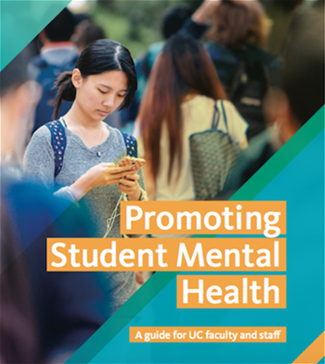Wellness and Work-life Balance
This UC guide for faculty and staff is also useful for graduate students who work with undergraduates or who would like more information about the student mental health services that are there to support them.
 From Vice Chancellor Margaret Klawunn:
From Vice Chancellor Margaret Klawunn:
Spring is traditionally a time of transition for students who may be experiencing excitement or uncertainty about their plans for the future. In addition, our campus has experienced a number of losses this year, which have impacted our student community. I want to take a moment to remind you of the important role faculty and staff play in promoting a positive academic and learning environment. Faculty and staff members have regular, daily contact with students and are often the first to notice signs of distress. With knowledge of appropriate resources, you can help prevent students' smaller concerns from escalating, and make important referrals to the many resources available to support students who may be struggling.
A helpful mental health resource, a handbook for faculty and staff entitled Promoting Student Mental Health: A Guide for UC Faculty and Staff, is available to download at http://www.ucop.edu/student
The guide is a comprehensive resource for staff members but it is not meant to replace the Distressed Students Protocol (attached) which outlines clear action to take to support a specific student in a distressed state. UCSB's Distressed Student Protocol, available through Student Mental Health Coordination Services (SMHCS), provides a decision tree to help you quickly decide the best course of action for a particular situation. The campus has an online reporting system that is available 24/7 at http://www.sa.ucsb.edu/REFE
Over the past year we have strengthened our mental health support system for our students through additional funding from the system-wide increase in Student Service Fees that has been directed to supporting student mental health. With this increase in funding we've hired seven additional psychologists in Counseling and Psychological Services (CAPS) and two additional psychiatrists and a social worker in Student Health Services. SMHCS and CAPS are also available to provide training to any department or groups of faculty and/or staff. Please contact SMHCS at 805-893-3030 (or Tracy Gillette at 805-893-7318).